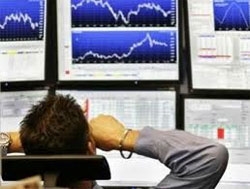European stocks, euro, slip amid Libya concerns
 |
| illustration photo |
London's FTSE 100 index of top shares fell 1.12 per cent to 6,014.8 points after hitting its highest level since May 2008 earlier in the day when it peaked at 6,105.77 points.
The Frankfurt DAX finished down 1.41 per cent at 7,321.81 points while the CAC 40 in Paris fell 0.44 per cent to 4,097.41 points amid fears that the unrest in Libya and the wider region could hit oil supplies.
The fall in Frankfurt came despite German business confidence hitting a third straight record high this month, according to the Ifo institute, with analysts cheering the results and hailing an exceptional rebound in Europe's top economy.
The ninth consecutive rise in the closely watched index caught economists surveyed by Dow Jones Newswires off guard and was taken as a sign that Germany has brushed off the worst effects of the eurozone debt crisis.
Also eurozone manufacturing and service activity in February hit levels last seen in July 2006 but inflation, an increasing concern, also jumped sharply, a closely watched survey showed on Monday.
The eurozone composite output index compiled by the Markit research firm rose 1.4 points from January to 58.4 points in February.
The EU and German surveys "suggest that the eurozone and German economies have started the year with a bang," said Ben May at Capital Economics.
However the shockwaves from the unrest in Libya did have an effect, particularly in its former colonial overlord Italy -- a top foreign investor in Libya and a country in which the North African state has also invested billions.
Libya's sovereign wealth fund and veteran ruler Moamer Kadhafi's family own stakes in Italy's biggest bank UniCredit, defence and industry giant Finmeccanica, as well as in the first-division Juventus football club.
Shares in UniCredit plunged 5.75 per cent by close of trading in Milan.
Libya is Unicredit's top shareholder with a 7.5-per cent stake and Libyan central bank governor Farhat Omar Bengdara is also Unicredit's vice-president.
Shares in energy major ENI, which has been in Libya since 1959 and produced 244,000 barrels of oil equivalent per day in 2009, also dropped 5.12 per cent.
Overall the Milan bourse plummeted 3.59 per cent on the day, the largest fall for a major European bourse.
Meanwhile Madrid was down 2.33 per cent and Lisbon by 2.17 percent.
The Swiss and Amsterdam stock markets made smaller losses, down 0.50 per cent and 0.87 percent respectively.
Asian stocks were mixed on Monday with Hong Kong down 0.47 per cent and Sydney off 0.74 percent while Tokyo overcame morning losses to end 0.14 per cent higher at 10,857.53, a near 10-month high.
Brent oil prices soared above $105 per barrel on Monday, striking a fresh two-year peak as the deadly violence in Libya fuelled concerns over spreading unrest in the Middle East and north Africa region.
Brent oil prices soared above $105 per barrel on Monday, striking a fresh two-year peak as the deadly violence in Libya fuelled concerns over spreading unrest in the Middle East and north Africa region.
"No one knows for sure what the situation is (in Libya) but it would appear that things have got a lot more potential to get a lot more violent and that would have a greater impact on infrastructures and industries' ability to operate," warned David Hart, oil and gas analyst at Westhouse Securities.
The euro currency also fell Monday against the dollar. Much of this could be attributed to profit-taking and caution amid the swirling market fears.
In late trading the euro changed hands at $1.3681 against $1.3691 in late trading Friday.
Against the Japanese currency it was stable at 113.75 yen.
The euro stood at 0.8432 British pounds, up from 0.8424 pounds and 1.2941 Swiss francs (1.2932).
The dollar started the weak the way it ended the last one, losing ground against the Japanese currency, standing 83.14 yen ( 83.16).
The pound was slightly down against the greenback, at $1.6225 against $1.6253 on Friday.
What the stars mean:
★ Poor ★ ★ Promising ★★★ Good ★★★★ Very good ★★★★★ Exceptional
Related Contents
Latest News
More News
- Cashless payments hit 28 times GDP in 2025 (February 04, 2026 | 18:09)
- SSIAM and DBJ launch Japan Vietnam Capital Fund (February 04, 2026 | 15:57)
- Banks target stronger profits, credit growth in 2026 (February 04, 2026 | 15:43)
- Vietnam on path to investment-grade rating (February 03, 2026 | 13:07)
- Consumer finance sector posts sharp profit growth (February 03, 2026 | 13:05)
- Insurance market building the next chapter of protection (February 02, 2026 | 11:16)
- NAB Innovation Centre underscores Vietnam’s appeal for tech investment (January 30, 2026 | 11:16)
- Vietnam strengthens public debt management with World Bank and IMF (January 30, 2026 | 11:00)
- Corporate bond market poised for stronger growth cycle (January 28, 2026 | 17:13)
- Vietnam's IPO market on recovery trajectory (January 28, 2026 | 17:04)

 Tag:
Tag:



















 Mobile Version
Mobile Version